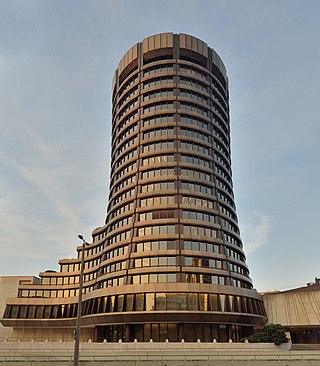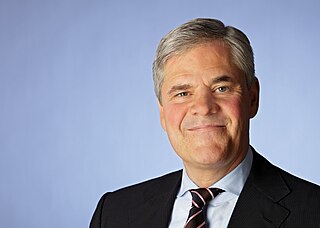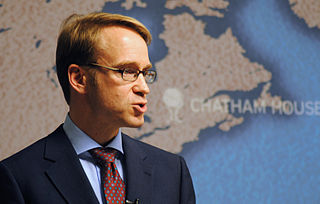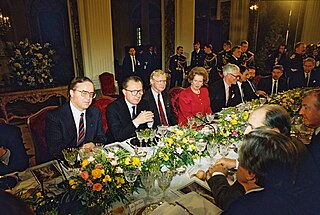
Helmut Schlesinger (born 4 September 1924 in Penzberg) is a German economist and former President of the Bundesbank.

Helmut Schlesinger (born 4 September 1924 in Penzberg) is a German economist and former President of the Bundesbank.
After his military duty, he studied economics at the University of Munich, from where he graduated with a Diplom in 1948, and with a Dr. oec. in economics in 1951.
He entered the German Central Bank in 1952 and ascended rapidly to the position of a department head. In 1964, he was appointed Director of Economics and Statistics, and became a member of the executive board in 1972. He served as deputy chairman from 1980 to 1991 and as President of the German Central Bank from 1991 to 1993, succeeding Karl Otto Pöhl a\nd succeeded by Hans Tietmeyer. Schlesinger has been a distinguished honorary professor at the German University of Administrative Sciences. He is currently an advisor to IDEAglobal Group, a global financial research organisation. [1]
He turned 100 on 4 September 2024. [2] [3]
He is a member of the Orders of Merit and of Chivalry of Germany, Italy, Austria, Hungary, Sweden, and Luxembourg. [4]

The Bank for International Settlements (BIS) is an international financial institution which is owned by member central banks. Its primary goal is to foster international monetary and financial cooperation while serving as a bank for central banks. With its establishment in 1930 it is the oldest international financial institution. Its initial purpose was to oversee the settlement of World War I war reparations.

Black Wednesday, or the 1992 sterling crisis, was a financial crisis that occurred on 16 September 1992 when the UK Government was forced to withdraw sterling from the (first) European Exchange Rate Mechanism , following a failed attempt to keep its exchange rate above the lower limit required for ERM participation. At that time, the United Kingdom held the Presidency of the Council of the European Union.

The Deutsche Bundesbank is the German member of the Eurosystem and has been the monetary authority for Germany from 1957 to 1998, issuing the Deutsche Mark (DM). It succeeded the Bank deutscher Länder, which had introduced the DM on 20 June 1948.

The Reichsbank was the central bank of the German Empire from 1876 until the end of Nazi Germany in 1945.

Karl Otto Pöhl was a German economist and a president of the Bundesbank and chairman of its Central Bank Council from 1980 to 1991.

Theodor Waigel is a German politician of the Christian Social Union in Bavaria (CSU). He represented Neu-Ulm in the Bundestag from 1976 to 2002.

Axel Alfred Weber is a German economist, professor, and banker. He is currently a board member and chairman of Swiss investment bank and financial services company, UBS Group AG, and has announced his resignation effective 7 April 2022.

Hans Tietmeyer was a German economist and regarded as one of the foremost experts on international financial matters. He was president of Deutsche Bundesbank from 1993 until 1999 and remained afterwards one of the most important figures in finance of the European Union.

The Bank deutscher Länder was a central bank established in 1948 to serve West Germany, issuing the Deutsche Mark. It was replaced in 1957 by the Deutsche Bundesbank.

Andreas Raymond Dombret is German-American banker who served as member of the executive board of the Deutsche Bundesbank from 2010 until 2018. In that capacity, he held responsibility for Banking and Financial Supervision, Risk Controlling and the Bundesbank's Representative Offices abroad.

Peter Bofinger is a German economist and a former member of the German Council of Economic Experts.

Karl Blessing was a German banker. He was President of the Deutsche Bundesbank from 1958 to 1969.

The Institute for Law and Finance (ILF) is a graduate school which was established as a non-profit foundation in 2002 by Goethe University Frankfurt am Main with the support of many prominent institutions. Leading commercial banks and international law firms, the Frankfurt Chamber of Commerce and Industry, the City of Frankfurt and the State of Hesse, as well as the European Central Bank and the Deutsche Bundesbank are actively involved in the ILF right from the planning stages until today. The ILF provides interdisciplinary training to lawyers, senior management and executives in Germany and worldwide and serves as a policy center in the legislative process by offering forums for discussions and exchanges between academia and practitioners.

Adam Simon Posen CBE is an American economist and President of the Peterson Institute for International Economics (PIIE). He became PIIE president on January 1, 2013, having first joined the Institute in July 1997.

Jens Weidmann is a German economist who served as president of the Deutsche Bundesbank between 2011 and 2021. He also served as chairman of the Board of the Bank for International Settlements (BIS).
Claudia Maria Buch is a German economist who serves as Chair of the ECB Supervisory Board since 2024. She previously was a Vice President of the Bundesbank from 2014 to 2023.
Otmar Emminger was a German economist who served as the president of the Deutsche Bundesbank from 1977 to 1979.

Sabine Lautenschläger is a German jurist who served as a member of the Executive Board of the European Central Bank from 2014 to 2019. She previously served as vice-president of the Deutsche Bundesbank from 2011 to 2013.
Joachim Nagel is a German economist who has been serving as President of the Bundesbank since 2022. Before he was a senior manager of the Bank for International Settlements since 2020, having been a member of the board of the Deutsche Bundesbank from 2010 to 2016 and then a member of the board of the KfW Bankengruppe from 2017 to 2020. He was appointed President of the Deutsche Bundesbank on 1 January 2022, to replace Jens Weidmann. He is a member of the Social Democratic Party of Germany (SPD), along with the President who appointed him to serve initially under SPD Chancellor Olaf Scholz.

The Delors Committee, formally known as the Committee for the Study of Economic and Monetary Union, was an ad hoc committee chaired by European Commission President Jacques Delors in 1988–1989. It was set up in June 1988 upon a mandate from the European Council to examine and propose concrete stages leading to European Economic and Monetary Union; its report, commonly known as the Delors Report, was published in April 1989.